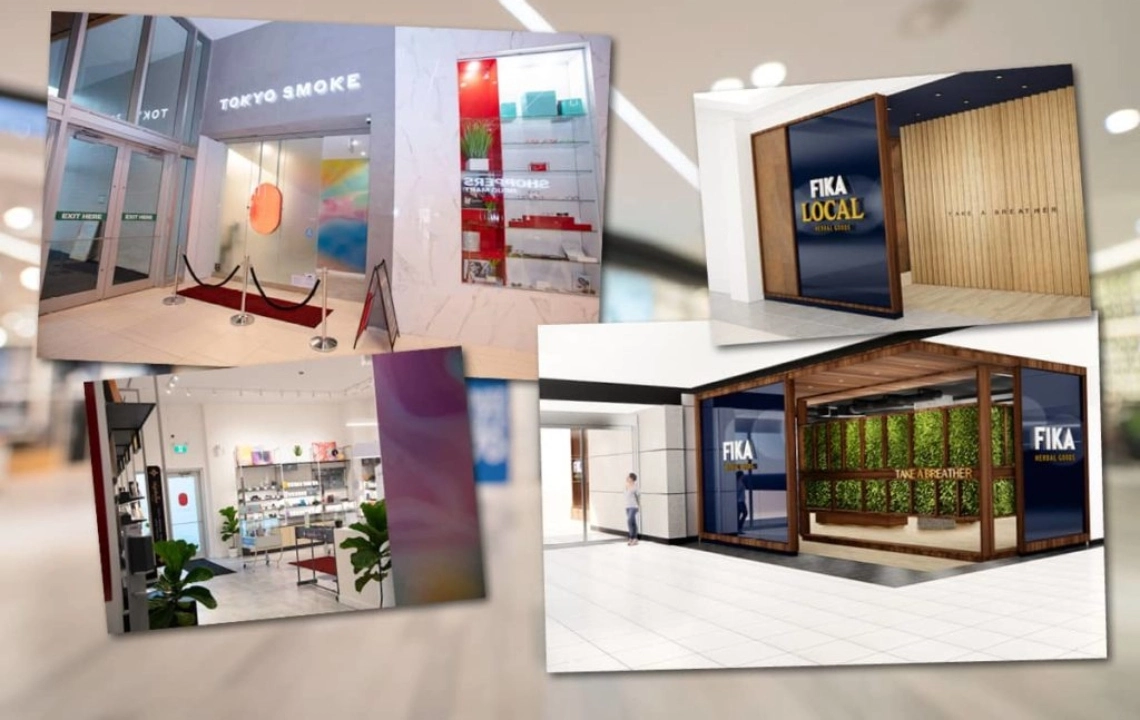Major free-standing shopping malls in Ontario, Canada, are throwing open their doors to cannabis stores, signaling the evolution of marijuana retail in the nation beyond more typical street-facing and strip-mall locations.
The impending growth in cannabis store mall openings in Canada’s biggest provincial cannabis market could bring opportunities for those retailers to:
- Reach untapped customer demographics and build brand awareness.
- Take advantage of high customer foot traffic.
- Make regular customers out of mall employees.
However, those advantages come with new challenges, including higher lease costs versus other retail real estate and, potentially, different expectations from mall shoppers.
At least two cannabis retail brands, Canopy Growth’s Tokyo Smoke banner and privately held Fika, are opening in Ontario malls operated by major commercial landlord Cadillac Fairview and others.
Canada’s maturing cannabis sector is experiencing “a lot more openness from landlords,” said Lacey Norton, Canopy’s Growth’s head of retail.
“From my perspective, it’s quite a big win, because in the early days, pre-legalization, when many retailers were looking to find real estate, getting into Main (and) Main premium locations as a retailer was proving to be quite challenging.”
Why cannabis stores want malls
Major cultivator Aurora Cannabis was an early leader in Canadian mall cannabis sales with its flagship retail store in the enormous West Edmonton Mall, in Edmonton, Alberta, which opened in late November 2019.
Business leaders need reliable industry data and in-depth analysis to make smart investments and informed decisions in these uncertain economic times.
Get your 2023 MJBiz Factbook now!
Featured Inside:
- 200+ pages and 50 charts with key data points
- State-by-state guide to regulations, taxes & opportunities
- Segmented research reports for the marijuana + hemp industries
- Accurate financial forecasts + investment trends
Stay ahead of the curve and avoid costly missteps in the rapidly evolving cannabis industry.
The 11,000-square-foot location is actually two attached stores, a licensed cannabis outlet and an experiential space that Aurora’s vice president of commercial strategy, Zamina Walji, said is “meant to really mimic a museum gift shop, if you will – so, a cannabis gift shop.”
The store, Aurora’s only retail location, is managed by Canadian cannabis retailer High Tide, which holds an investment stake in the Edmonton-based company.
Walji said the West Edmonton Mall store benefits from serving “every kind of demographic.”
“The mall has a lot of activities in place already to drive traffic,” Walji said. “So we get to piggyback off of those traffic-driving activities, as well as mall promotions.”
Walji said the store also benefits from a captive audience of mall workers who are particularly loyal customers.
Until now, Walji added, having a mall store has “been a differentiator for the (Aurora) brand.”
By the end of this year, Canopy’s Tokyo Smoke retail brand is slated to open mall stores in four Cadillac Fairview malls: the Eaton Centre, Fairview Mall and Sherway Gardens in Toronto as well as the Rideau Centre in Ottawa.
Canopy’s Norton said the mall real estate was secured by the Katz Group, one of Canopy’s Ontario retail partners, which operates Tokyo Smoke stores in the province.
A Tokyo Smoke has already opened in the Devonshire Mall in Windsor, Ontario, which is not a Cadillac Fairview property.
Ontario cannabis retailer Fika also is working to open locations this year and next in several Cadillac Fairview malls.
Several of the venues will be located in the same malls as Tokyo Smoke stores: In Toronto, at the Eaton Centre, Fairview Mall and Sherway Gardens, as well as the Rideau Centre in Ottawa.
In Kitchener, Fika will open in Fairview Park mall.
Fika is also opening a store in Toronto’s Dufferin Mall, which is owned by retail landlord Primaris, a division of H&R REIT.
“We believe that these sites are locations that are conveniently located within underserved, high-traffic markets,” said Chris Kane, Fika’s chief operating officer.
Two of Fika’s upcoming mall locations have both interior and exterior entrances, Kane said.
“It matters because it gives the customer two ways of getting into the location,” he said.
“And also, we don’t know what COVID is going to bring to the table down the road.”
When Canada’s recreational cannabis market was younger, Kane added, “people were just taking any site that came available.”
“That’s not what we’re doing. We are looking for sites that are going to be sustainable for the long term.”
Why malls want cannabis stores
Cadillac Fairview declined an interview with MJBizDaily to discuss why it decided to welcome cannabis stores into its Canadian mall properties.
However, cannabis retailers could offer several advantages from a mall landlord’s perspective, particularly if they were hit hard by the COVID-19 pandemic.
“Cannabis just seems like a really great solution to a problem that might take a couple of years to solve, from a mall perspective, in regards to the vacancy (issue),” said Leandra Reid, co-founder of Toronto-based cannabis retail consultancy Vetrina Group.
Plus, Reid noted, Canadian cannabis retail is a growing sector.
“With a tenant like Tokyo Smoke (that is) backed by big investment, the risk that Tokyo Smoke isn’t able to pay rent is less,” she said.
“And also, a cannabis store in a Cadillac Fairview mall like (the Toronto) Eaton Centre is going to create some big buzz.”
Aurora’s Walji observed that “considering that (the West Edmonton Mall) really caters to tourists, I think the mall operators could see the synergies between having a cannabis store and the tourist traffic.”
“They also have a hotel and a water park, and all of those kinds of things. So (the mall) is thinking about providing that consumer (with) a one-stop shop.”
Making the most of malls
Leasing space in a free-standing mall generally costs more than other retail real estate on a per-square-foot basis, acknowledged Canopy’s head of retail Norton.
“But from a typical retailer perspective, the amount of traffic and the amount of intentional traffic that exists in a mall certainly accounts for the premium that you pay,” she said.
Fika’s Kane also suggested high foot traffic would be key to overcoming the higher costs of mall leases.
“It all comes down to a site-by-site analysis,” he said.
“We do our due diligence on every site and put it through a very rigorous process of what we think the traffic counts in the mall (are) going to be, as well as our capture (rate).”
For cannabis retailers weighing a potential mall location, Aurora’s Walji suggested considering how much space the store really needs.
“In retail, it’s all about sales per square foot,” she said.
Walji also recommended building a solid relationship with the mall operator and ensuring flexibility for a cannabis store’s particular needs as you work on a contract.
“For example, malls are very particular about when you can get deliveries,” she said.
Consultant Reid said cannabis retailers looking at mall space “have to listen to who your target customer is and (consider) how you intend to solve a problem for that customer by showing up in a mall.”
Retail strategies that work at a strip-mall store or a street-facing location might have to be adjusted for a shopping mall, she added, citing issues such as product assortment and mall-goers’ expectations of an approachable, tactile shopping experience.
Some cannabis retail concepts might not be suited to a shopping mall, said Reid.
“What is your objective, what’s your long-term goal? … Not all stores are right for malls, so just because someone else is doing it doesn’t mean that you should be doing it.”
Solomon Israel can be reached at solomon.israel@mjbizdaily.com.





